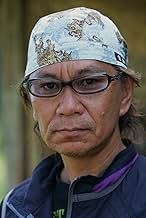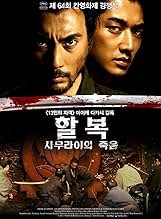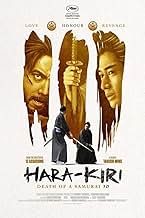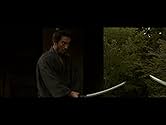IMDb रेटिंग
7.3/10
9.8 हज़ार
आपकी रेटिंग
अपनी भाषा में प्लॉट जोड़ेंA tale of revenge, honor and disgrace, centering on a poverty-stricken samurai who discovers the fate of his ronin son-in-law, setting in motion a tense showdown of vengeance against the hou... सभी पढ़ेंA tale of revenge, honor and disgrace, centering on a poverty-stricken samurai who discovers the fate of his ronin son-in-law, setting in motion a tense showdown of vengeance against the house of a feudal lord.A tale of revenge, honor and disgrace, centering on a poverty-stricken samurai who discovers the fate of his ronin son-in-law, setting in motion a tense showdown of vengeance against the house of a feudal lord.
- निर्देशक
- लेखक
- स्टार
- पुरस्कार
- 6 कुल नामांकन
Eita Nagayama
- Motome Chijiiwa
- (as Eita)
Gorô Daimon
- Priest
- (as Goro Daimon)
फ़ीचर्ड समीक्षाएं
Let's get this out of the way.
Kobayashi's hard hitting "Harakiri" is a masterpiece. It's one of the great pieces of not only Japanese cinema, but also one of the best movies of the 20th century. While I'm disappointed the film was remade at all, and surprised it came from Miike, there are still good things to be found here. To my surprise, for the most part, this is a good movie and in very small quantities, there are some true moments of greatness. Even if they are very short.
A good deal of the original film's grit is lost for most of this go around. The cinematography is over-lit and the pacing falls into lulls. But survive to the end and you will be rewarded as the final irony is quite powerful. I mean, no spoilers from me, but even with the cheesy fake snow, I have to say, Ebizô Ichikawa's powerful presence won me over and he truly wins the day when the time calls for it.
I was never too crazy about all the Kurosawa remakes of the 60s and 70s. Fistful of Dollars always felt like a cheap knock-off, because it is. The Magnificent Seven was sort of a tolerable chuckle. Kurosawa's films were so human, almost populist, because of their themes, his work was ripe for remake, reboot or even plagiarism. Only Star Wars seemed to get the joke and succeed in being something different than a pure Hidden Fortress copy. Kobayashi's Harakiri seemed to escape the trend for so long because of the subject matter - even the title! But here we are. There is still something not right about this "remake," but MIike gets it right in the end, even if never needed to be done in the first place.
Kobayashi's hard hitting "Harakiri" is a masterpiece. It's one of the great pieces of not only Japanese cinema, but also one of the best movies of the 20th century. While I'm disappointed the film was remade at all, and surprised it came from Miike, there are still good things to be found here. To my surprise, for the most part, this is a good movie and in very small quantities, there are some true moments of greatness. Even if they are very short.
A good deal of the original film's grit is lost for most of this go around. The cinematography is over-lit and the pacing falls into lulls. But survive to the end and you will be rewarded as the final irony is quite powerful. I mean, no spoilers from me, but even with the cheesy fake snow, I have to say, Ebizô Ichikawa's powerful presence won me over and he truly wins the day when the time calls for it.
I was never too crazy about all the Kurosawa remakes of the 60s and 70s. Fistful of Dollars always felt like a cheap knock-off, because it is. The Magnificent Seven was sort of a tolerable chuckle. Kurosawa's films were so human, almost populist, because of their themes, his work was ripe for remake, reboot or even plagiarism. Only Star Wars seemed to get the joke and succeed in being something different than a pure Hidden Fortress copy. Kobayashi's Harakiri seemed to escape the trend for so long because of the subject matter - even the title! But here we are. There is still something not right about this "remake," but MIike gets it right in the end, even if never needed to be done in the first place.
Takashi returns to the samurai world after the success of '13 assassins' in 2011. This movie was a remake of 1962 'Harakiri' which was also a massive hit movie. I have not seen the original but this movie blown me away. As usual the story opens slow and hard to identify the situation of the story but at the right middle of the movie the flashback strikes with awesome drama about poverty and family sentiment. Once the flashback was told you will easily say where the movie is heading. The story was classic and the movie was presented with rich cinematography. The first digital 3D movie for Takashi Miike as well the first 3D movie to premier at 2011 Cannes film festival.
You have to learn a word to understand the movie completely. 'Seppuku' - which means ritual suicide committed by a samurai. So that is why it's called 'Hara-kiri: death of a samurai'. You must have patience during opening sequences, without character and story development you will be in a tough position to understand about what's going on. While the story and character progress with the development you will start to get and you may fall for the emotion parts if you are a tenderhearted. And also you will be uncomfortable during 'seppuku' scene.
Takashi Miike's career best, this is what already everyone saying about it. But Its to hard to say which was his best, I like many of his works. I might be overwhelmed by the watch but will be happy to recommend it to others. I was very little unhappy for the ending scene otherwise I could have said it is the best of Takashi's work.
I am so curious about Takashi Miike's upcoming and Hollywood debutante project 'The outside' with Tom Hardy. Expecting it would be another 'The last samurai', I wish a good luck to the team.
You have to learn a word to understand the movie completely. 'Seppuku' - which means ritual suicide committed by a samurai. So that is why it's called 'Hara-kiri: death of a samurai'. You must have patience during opening sequences, without character and story development you will be in a tough position to understand about what's going on. While the story and character progress with the development you will start to get and you may fall for the emotion parts if you are a tenderhearted. And also you will be uncomfortable during 'seppuku' scene.
Takashi Miike's career best, this is what already everyone saying about it. But Its to hard to say which was his best, I like many of his works. I might be overwhelmed by the watch but will be happy to recommend it to others. I was very little unhappy for the ending scene otherwise I could have said it is the best of Takashi's work.
I am so curious about Takashi Miike's upcoming and Hollywood debutante project 'The outside' with Tom Hardy. Expecting it would be another 'The last samurai', I wish a good luck to the team.
It would've taken guts to remake one of the most acclaimed Japanese films of all time (1962's Harakiri), but then again, no one could accuse Takashi Miike of being a gutless filmmaker. I was curious to see this because some of Miike's best films are remakes or updates of stories that have already been adapted to film (like 13 Assassins and Graveyard of Honour).
This remake really follows the original perhaps a little too closely. I think it's just a few minutes shorter, and I can really only think of one scene that was in the original that wasn't in this. Visually, it replicates Masaki Kobayashi's style really well, but maybe part of me was hoping that Takashi Miike would do something a little more out-there or unexpected. Instead, he chose to be reverent to the original, but then again, it is a classic film that deserves reverence.
There's one infamous scene from the original that feels even harder to watch here, and I think the climax shakes things up a little too, to mixed effect (the final fight is fairly different). Otherwise, the story and all the characters are near-identical, and anyone familiar with the 1962 version is unlikely to find too many surprises here.
It's strange to try and review this, because it is a high-quality film... yet it's based on a high-quality classic that still holds up extremely well, so I'm not entirely sure what the rationale was behind this. For those who want to see a more modern-looking version of Harakiri in colour instead of black and white, this is very well-made and watchable, but I feel like the original is still more worthy of being watched first, for anyone unfamiliar with either film.
This remake really follows the original perhaps a little too closely. I think it's just a few minutes shorter, and I can really only think of one scene that was in the original that wasn't in this. Visually, it replicates Masaki Kobayashi's style really well, but maybe part of me was hoping that Takashi Miike would do something a little more out-there or unexpected. Instead, he chose to be reverent to the original, but then again, it is a classic film that deserves reverence.
There's one infamous scene from the original that feels even harder to watch here, and I think the climax shakes things up a little too, to mixed effect (the final fight is fairly different). Otherwise, the story and all the characters are near-identical, and anyone familiar with the 1962 version is unlikely to find too many surprises here.
It's strange to try and review this, because it is a high-quality film... yet it's based on a high-quality classic that still holds up extremely well, so I'm not entirely sure what the rationale was behind this. For those who want to see a more modern-looking version of Harakiri in colour instead of black and white, this is very well-made and watchable, but I feel like the original is still more worthy of being watched first, for anyone unfamiliar with either film.
Takashi Miike's second straight tribute to the samurai genre is a well-crafted and finely honed object. It's more consistent than Miike's previous samurai film, 13 Assassins, although that also means it lacks anything as great as that film's final battle. But what sets Hara-Kiri apart is its willingness to not just offer a pastiche of these films but genuinely question their values in a way that is still challenging to the contemporary viewer.
Through a series of events told partially in flashbacks, Hara-Kiri poses the question of how relevant our values are -- whether they be highly codified values like honour or the more nebulous instincts that guide us today -- in the face of human suffering. The ronin that we see humiliated and killed in the first act is not guilty of breaking some arcane samurai bylaw but of doing something most of us would find disgraceful. But as the film goes on it argues that we should hold compassion even for people such as this, and that honour is ultimately irrelevant in the face of social suffering. In an age of recession and austerity, where so many try to cling to their ideas of what they or other people "deserve", this is an important message.
It's an easy film to appreciate and a difficult one to love -- there's a kind of coldness to this set of Miike's movies that seems out of place with the gonzo enthusiasm of his earlier work. And doubtlessly it will be too slow and cerebral for some. But its critique of not just a canonized genre but the way in which we view ethics makes it well worth seeing.
Through a series of events told partially in flashbacks, Hara-Kiri poses the question of how relevant our values are -- whether they be highly codified values like honour or the more nebulous instincts that guide us today -- in the face of human suffering. The ronin that we see humiliated and killed in the first act is not guilty of breaking some arcane samurai bylaw but of doing something most of us would find disgraceful. But as the film goes on it argues that we should hold compassion even for people such as this, and that honour is ultimately irrelevant in the face of social suffering. In an age of recession and austerity, where so many try to cling to their ideas of what they or other people "deserve", this is an important message.
It's an easy film to appreciate and a difficult one to love -- there's a kind of coldness to this set of Miike's movies that seems out of place with the gonzo enthusiasm of his earlier work. And doubtlessly it will be too slow and cerebral for some. But its critique of not just a canonized genre but the way in which we view ethics makes it well worth seeing.
Anyone with a more than passing interest in Japanese movies ought to watch Kobayashi's 1962 version of Takaiguchi's novel that this also is based on, and watch the intro by the Japanese film authority Donald Ritchie on the Criterion edition. Ritchie makes fully clear how Kobayashi here, as in other films, is talking through the historical tale about current issues he was passionate about, in this case lingering post-WWII authoritarianism in Japan and hollow bureaucracies, in his day as in the time of the early Tokugawa government; Miike doesn't seem to have anything particularly urgent to say. Look at what Ritchie points out that Kobayashi's version offers: the script by ace screenwriter Shinobu Hashimoto who wrote Akira Kurosawa's Seven Samurai; the score by bold, influential experimentalist Toru Takemitsu; the strong and unifying symbolic use of empty samurai armor throughout; the career-defining lead performance by Tatsuya Nakadai; and the elegantly austere use of black and white cinematography.
Ironically Miike's film also carries over Kobayashi's one serious flaw - - an overindulgence in sentimentality and pathos in the flashback love story.
Miike, apparently seeking 'respectability' after all his entertaining ultra-violence with this staid remake/adaptation, also overdoes everything. He makes every scene too drawn-out and talky. He further overdoes the sentimentality, to the point that in his version becomes unbearably cloying, virtually unwatchable. Once again, 3D adds nothing; black and white was just what was needed. Less was and is more.
Whenever a filmmaker goes over familiar ground, adapting a book that has been adapted (and very well) before, he exposes himself to comparisons to the book and to the previous adaptation. Don't get me wrong. Miike has plenty of skill. It is not that his 'Hara- Kiri' is a washout. It's just that Kobayashi's version is a true work of art, a film classic, in fact; and in comparison Miike's is merely a competent effort and a pointless bid for respectability that was not needed. He is a master in his own realm. Surprisingly his last film before this, the juicy, action-historical blockbuster 13 Assassins, which I thoroughly enjoyed, also was an adaptation -- of Eiichi Kudo's little known samurai film of the same name. Thanks to 'Wildgrounds' (who compare the two Hara- Kiri films) for this info. Thanks also to Ben Parker on 'CapitalNewYork' for his detailed comparison of the two films; and to the Criterion Collection, for its print of Kobayashi's 'Hara-Kiri' and Donald Ritchie's informed introduction to it.
Ironically Miike's film also carries over Kobayashi's one serious flaw - - an overindulgence in sentimentality and pathos in the flashback love story.
Miike, apparently seeking 'respectability' after all his entertaining ultra-violence with this staid remake/adaptation, also overdoes everything. He makes every scene too drawn-out and talky. He further overdoes the sentimentality, to the point that in his version becomes unbearably cloying, virtually unwatchable. Once again, 3D adds nothing; black and white was just what was needed. Less was and is more.
Whenever a filmmaker goes over familiar ground, adapting a book that has been adapted (and very well) before, he exposes himself to comparisons to the book and to the previous adaptation. Don't get me wrong. Miike has plenty of skill. It is not that his 'Hara- Kiri' is a washout. It's just that Kobayashi's version is a true work of art, a film classic, in fact; and in comparison Miike's is merely a competent effort and a pointless bid for respectability that was not needed. He is a master in his own realm. Surprisingly his last film before this, the juicy, action-historical blockbuster 13 Assassins, which I thoroughly enjoyed, also was an adaptation -- of Eiichi Kudo's little known samurai film of the same name. Thanks to 'Wildgrounds' (who compare the two Hara- Kiri films) for this info. Thanks also to Ben Parker on 'CapitalNewYork' for his detailed comparison of the two films; and to the Criterion Collection, for its print of Kobayashi's 'Hara-Kiri' and Donald Ritchie's informed introduction to it.
क्या आपको पता है
- ट्रिवियाThe first 3D title ever to be shown in official selection at the Cannes Film Festival.
- गूफ़As the wooden wakizashi is pushed into the stomach (after the tip snapped off), you can see that the blade is sliding into the handle.
- भाव
Hanshirô Tsugumo: A warrior's honor is not something simply worn for show!
- कनेक्शनFeatured in At the Movies: Cannes Film Festival 2011 (2011)
टॉप पसंद
रेटिंग देने के लिए साइन-इन करें और वैयक्तिकृत सुझावों के लिए वॉचलिस्ट करें
- How long is Hara-Kiri: Death of a Samurai?Alexa द्वारा संचालित
विवरण
- रिलीज़ की तारीख़
- कंट्री ऑफ़ ओरिजिन
- आधिकारिक साइटें
- भाषा
- इस रूप में भी जाना जाता है
- Hara-Kiri: Death of a Samurai
- उत्पादन कंपनियां
- IMDbPro पर और कंपनी क्रेडिट देखें
बॉक्स ऑफ़िस
- US और कनाडा में सकल
- $75,688
- US और कनाडा में पहले सप्ताह में कुल कमाई
- $10,920
- 22 जुल॰ 2012
- दुनिया भर में सकल
- $54,35,358
- चलने की अवधि2 घंटे 8 मिनट
- रंग
- ध्वनि मिश्रण
- पक्ष अनुपात
- 2.35 : 1
इस पेज में योगदान दें
किसी बदलाव का सुझाव दें या अनुपलब्ध कॉन्टेंट जोड़ें
































